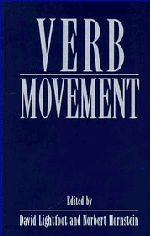Book contents
- Frontmatter
- Contents
- List of contributors
- Preface
- Verb movement: an introduction
- 1 Verb positions: evidence from Italian
- 2 Verb movement and word order in Arabic
- 3 Comments on the paper by Ouhalla
- 4 Some similarities and differences between Icelandic and Yiddish
- 5 Comments on the paper by Santorini
- 6 Finite verb movement in Scandinavian embedded clauses
- 7 Comments on the paper by Vikner
- 8 The Brythonic copula and head raising
- 9 A reinterpretation of evidence for verb movement in French
- 10 Two types of head movement in Romance
- 11 Comments on the paper by Roberts
- 12 Licensing heads
- 13 Comments on the paper by Koopman
- 14 Finiteness and head movement in early child grammars
- 15 Comments on the paper by Wexler
- References
- Index
15 - Comments on the paper by Wexler
Published online by Cambridge University Press: 03 May 2011
- Frontmatter
- Contents
- List of contributors
- Preface
- Verb movement: an introduction
- 1 Verb positions: evidence from Italian
- 2 Verb movement and word order in Arabic
- 3 Comments on the paper by Ouhalla
- 4 Some similarities and differences between Icelandic and Yiddish
- 5 Comments on the paper by Santorini
- 6 Finite verb movement in Scandinavian embedded clauses
- 7 Comments on the paper by Vikner
- 8 The Brythonic copula and head raising
- 9 A reinterpretation of evidence for verb movement in French
- 10 Two types of head movement in Romance
- 11 Comments on the paper by Roberts
- 12 Licensing heads
- 13 Comments on the paper by Koopman
- 14 Finiteness and head movement in early child grammars
- 15 Comments on the paper by Wexler
- References
- Index
Summary
Ken Wexler's paper is an important contribution both to the theory of verb movement and to the theory of language acquisition. I will briefly discuss the significance of this work with respect to the view that linguistic analyses are carried out at early stages without benefit of functional categories. The bulk of the commentary will be devoted to exploring the details of Wexler's analysis of the optional infinitive stage in English. Wexler proposes two analyses for this stage. The first treats the child and adult's grammar on a par, claiming that verb lowering applies in each case. We will see that while this analysis is descriptively adequate, it carries the cost of having to explicitly mark matrix indicative clauses as untensed. This flies in the face of the fact that matrix indicatives are always related to a moment of speech in the tense structure of adult grammars. The second analysis treats child English as a verb-raising language like French, Dutch, or German. We will see that this analysis faces some descriptive problems that can be solved by claiming that the projection of object agreement (AGRo) is missing at the early stages of language development in English. We will show that the simple assumption that AGRo is missing at early stages explains Borer & Wexler's (1987) observation that the child cannot form A-chains while dispensing with the extra theoretical assumptions that they invoke.
- Type
- Chapter
- Information
- Verb Movement , pp. 351 - 362Publisher: Cambridge University PressPrint publication year: 1994



